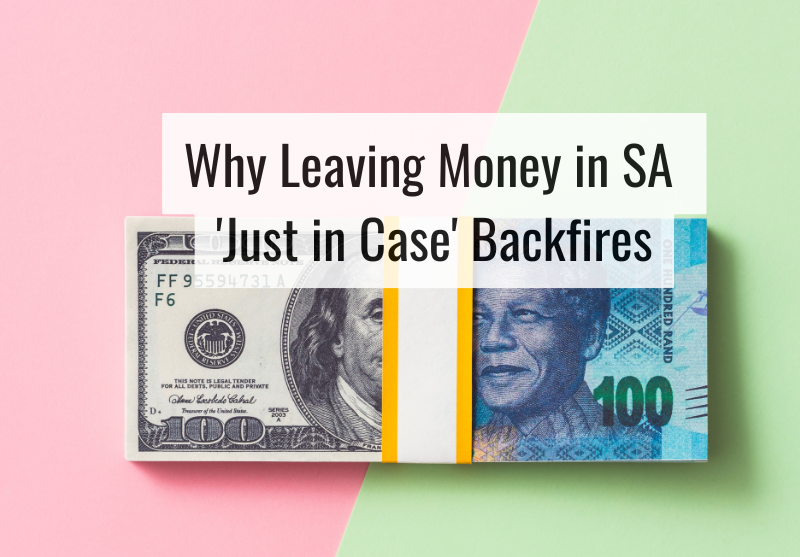The Safety Net That’s Actually a Trap
It seems sensible, doesn’t it? Keep R5 million in South Africa “just in case.” Maybe you’ll need it for family emergencies, property opportunities, or business ventures back home. Perhaps you’re hedging your bets, maintaining financial ties to South Africa while building your new life abroad.
This thinking feels prudent and conservative. You’re not putting all your eggs in one basket. You’re maintaining options. You’re being responsible.
But this “safety net” strategy is quietly creating the very risks you’re trying to avoid.
The False Security of South African Holdings
Keeping substantial money in South Africa while living abroad creates an illusion of security that masks significant wealth erosion. Your R5 million feels safe because it’s in familiar banks, earning predictable returns, protected by deposit guarantees.
Meanwhile, multiple factors are working against this money in ways that don’t appear on your bank statements but steadily reduce its real value and accessibility.
The Currency Erosion Reality
Your R5 million “safety net” loses international purchasing power every time the rand weakens. Over recent years, this has been a consistent trend rather than occasional volatility.
Against major currencies like the US Dollar, Euro, Australian Dollar, and New Zealand Dollar, the rand has shown persistent weakness. Your R5 million today buys significantly less internationally than it did five years ago.
This erosion continues whether you’re paying attention or not. Your bank statements show growth in rand terms while your international purchasing power steadily declines.
The Inflation Double-Hit
South African inflation compounds currency weakness, creating double erosion of your wealth’s real value. While your money earns modest interest, inflation often exceeds these returns, creating negative real returns.
On R5 million, even small negative real returns compound into substantial wealth destruction over time. The safety of principal preservation masks the reality of purchasing power loss.
The Access Illusion
Your R5 million feels accessible until you actually need it for international purposes. Then you discover the transfer restrictions, compliance requirements, and processing delays that make this “liquid” asset effectively illiquid for urgent international needs.
Emergency situations reveal that money appearing readily available is actually trapped behind regulatory procedures that can take months to navigate.
The Opportunity Cost Catastrophe
Perhaps most damaging is what your R5 million isn’t doing while sitting in South African accounts. International investment opportunities in your new country remain inaccessible while substantial capital earns suboptimal returns in South Africa.
Property markets, business ventures, education funding, and investment portfolios in your new location can’t benefit from capital trapped in South African safety nets.
The Regulatory Risk You Can’t Control
Exchange control regulations continue evolving, generally becoming more restrictive rather than more liberal. Today’s accessible R5 million might face additional access restrictions tomorrow.
Regulatory changes can occur with limited notice, potentially affecting your ability to move money when you need it most. The regulatory trajectory trends toward complexity rather than simplification.
The Tax Complication Factor
Maintaining substantial South African assets while living abroad creates ongoing tax complications in both countries. Cross-border tax issues become more complex, not simpler, when significant wealth remains in South Africa.
Your new country may require disclosure and reporting of South African assets, creating administrative burdens and potential compliance risks that simple domestic arrangements would avoid.
The Banking Relationship Burden
Maintaining R5 million in South African accounts requires ongoing banking relationship management that becomes increasingly difficult from abroad. Account maintenance, compliance updates, and regulatory changes demand attention and presence that expat life makes challenging.
Banking relationships deteriorate over time without regular local interaction, potentially creating future access problems when you need the money most.
The Real Cost of ‘Safety’
Let’s calculate what this “safety” actually costs over five years on R5 million:
Currency depreciation against international currencies: potentially R1-2 million in lost international purchasing power. Opportunity cost versus international investment alternatives: potentially R1-3 million in missed returns.
Inflation erosion of real value: approximately R500,000-R1 million in reduced purchasing power. Administrative and compliance costs: R100,000+ in professional fees and banking charges.
Combined costs: R2.5-6.5 million over five years. Your “safe” R5 million could cost you more than the principal amount in real terms.
The Psychology of the Safety Net
The emotional comfort of keeping money in South Africa often outweighs rational financial analysis. Familiar feels safer than optimal, even when familiar is actually riskier in real terms.
This psychological attachment to geographical safety nets can prevent optimal financial positioning and wealth preservation strategies.
The Backfire Effect
The irony is that keeping money in South Africa “just in case” often ensures you’ll need it for exactly the problems it creates: currency losses requiring top-ups, missed opportunities requiring additional capital, emergency access problems requiring expensive expedited solutions.
The safety net becomes the trap it was meant to prevent.
The Strategic Alternative
Smart expats recognise that true financial security comes from optimal positioning of wealth rather than geographical distribution. Moving the R5 million to appropriate international structures can provide:
Better currency protection through diversification. Superior investment opportunities with higher potential returns. Simplified tax compliance and reduced regulatory risk. True accessibility for international needs and emergencies.
Professional Repositioning
The complexity of optimally repositioning substantial wealth requires expertise in both South African exit procedures and international wealth management. Professional guidance can navigate this transition while preserving value and reducing risks.
The cost of professional assistance typically represents a fraction of the ongoing costs of suboptimal positioning.
Your Wealth Security Decision
Every month your R5 million remains in South Africa as a “safety net,” it faces the risks and costs that make this strategy counterproductive. True wealth security requires strategic positioning, not geographical sentiment.
The question isn’t whether to maintain South African connections – it’s whether keeping substantial money there actually serves your security interests or undermines them.
Don’t let another year pass while your safety net becomes a wealth trap. Contact Rudi at Fin Select today to discuss strategic repositioning of your South African holdings.
Because real security comes from smart positioning, not familiar places.


